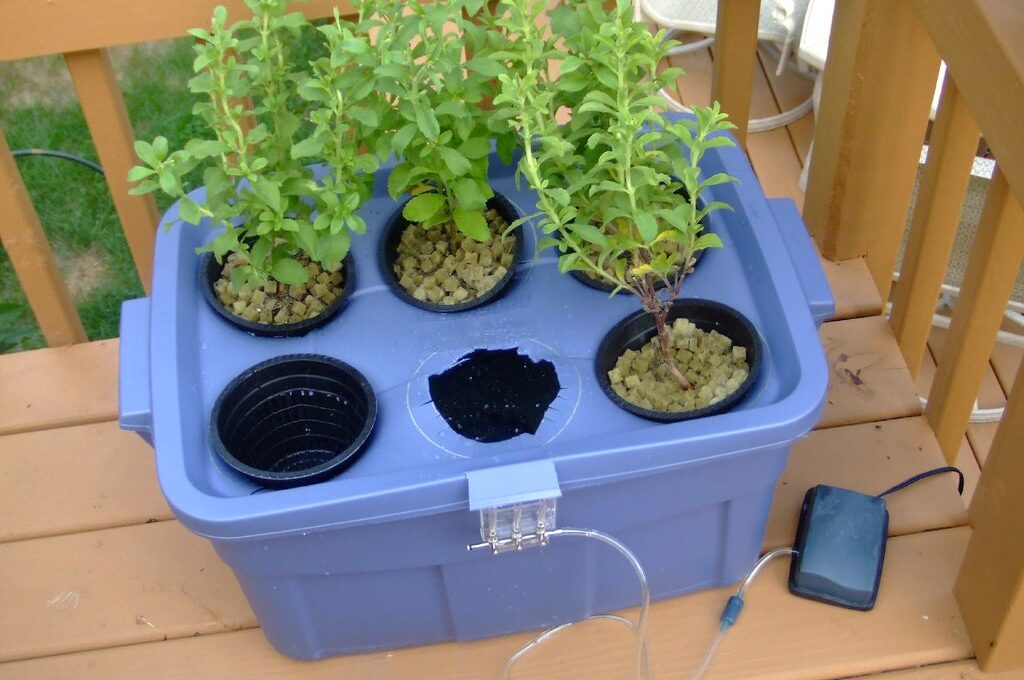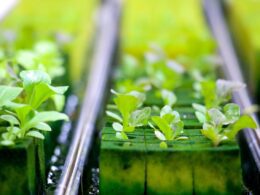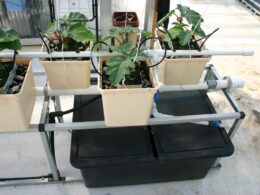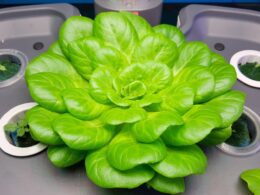Are you considering starting a hydroponic garden? Hydroponics is a great way to grow your own fresh produce without soil, using only water and nutrients.
However, not all vegetables are suitable for hydroponic growing. In this article, we will explore which vegetables you should avoid growing using hydroponics and why.
It’s important to understand the challenges of hydroponic gardening and the limitations it may have on certain vegetables. By knowing which vegetables are not suitable for hydroponics, you can save yourself time, money, and frustration.
So, before you start planting, let’s dive into the world of hydroponic gardening and find out which vegetables you should avoid growing using this method.
Understanding Hydroponics and Its Advantages
Hydroponics is an amazing way to grow your own fresh produce, and you’ll be blown away by the advantages it offers! One of the biggest benefits of hydroponic farming is that it allows you to grow plants without soil, which means you’ll have more control over the nutrients your plants receive. This can lead to faster growth, bigger yields, and healthier plants overall.
There are several types of hydroponic systems to choose from, each with its own unique advantages. For example, a deep water culture system involves suspending plants in nutrient-rich water, while an aeroponic system uses mist to deliver nutrients to the roots. No matter which system you choose, you’ll be able to customize the conditions to suit the specific needs of your plants, which will lead to better results.
In addition to being highly effective, hydroponic farming is also incredibly safe. Because you’re not using soil, you don’t have to worry about harmful bacteria or pests that can harm your plants or your family. Plus, hydroponic systems are often less resource-intensive than traditional farming methods, which means you’ll be doing your part to protect the environment while still enjoying fresh, healthy produce.
Challenging Vegetables for Hydroponics
Growing certain veggies hydroponically can be quite challenging. While hydroponics is a highly efficient way to grow plants, there are still some vegetables that won’t thrive in this environment. Here are some challenging veggies for hydroponics:
- Corn: This crop requires a lot of space and nutrients to grow properly, which can be difficult to achieve in a hydroponic system.
- Pumpkins: Similar to corn, pumpkins also require a lot of space and nutrients. Additionally, they need a lot of support as they grow, which can be difficult to provide in a hydroponic setup.
- Carrots: Although carrots can be grown in hydroponics, they are challenging because they require a lot of depth to grow properly. This means that you would need a deep water culture system, which can be more difficult to set up and maintain than other types of hydroponics.
When it comes to hydroponics, there are many factors to consider. One of the main ones is whether to grow your plants indoors or outdoors. Indoor hydroponics has the benefit of being able to control the environment more precisely, but it can also be more expensive to set up.
Outdoor hydroponics, while cheaper, is subject to weather and other environmental factors that can be difficult to control. Additionally, another factor to consider is whether to grow your plants in soil or water. While soil is more traditional and can provide some nutrients naturally, water-based hydroponics can be more efficient and allow for more precise nutrient control.
In the end, while hydroponics has many benefits, it’s not the best choice for every type of vegetable. But, with the right setup and careful planning, you can still grow a wide variety of crops hydroponically. So, don’t be afraid to experiment and find the best solution for your needs.
Is There Any Vegetable That Should Not Be Grown in Hydroponics?
When it comes to hydroponics, the choice of the best vegetable for hydroponics depends on various factors. While most vegetables thrive in this soilless system, some may not be ideal. Root crops like carrots or potatoes are generally not recommended due to their growth habits. Optimal results are often achieved with leafy greens such as lettuce, spinach, or kale, making them the best vegetable for hydroponics.
Reasons Why Certain Vegetables are Difficult to Grow
It’s important to understand the reasons why some veggies pose a challenge for cultivation, as this knowledge can help you make informed decisions about your gardening approach.
Soil limitations can be one of the factors that make certain vegetables difficult to grow hydroponically. Some plants require specific soil conditions that are difficult to replicate in hydroponic systems. For example, root vegetables like carrots and potatoes need loose, well-draining soil that is difficult to achieve in hydroponics.
Climate constraints can also make it difficult to grow certain vegetables using hydroponics. Some plants require specific temperature and humidity conditions that are hard to achieve in an indoor hydroponic environment. For instance, heat-loving vegetables such as tomatoes and peppers may not produce as well in hydroponics as they would in a traditional soil garden. Additionally, plants that require a lot of light may struggle to thrive in indoor hydroponic setups.
Despite these challenges, many vegetables can still be grown successfully using hydroponics. With careful planning and attention to detail, you can build a hydroponic system that meets the needs of your chosen crops.
By understanding the limitations of hydroponics, you can select the right vegetables to grow and optimize your chances of success. So don’t be discouraged by the challenges, but rather embrace them as an opportunity to learn and grow as a gardener.
Alternative Gardening Methods
If you’re looking for a different approach to gardening, there are other methods available to explore. One of these methods is vertical gardening. This technique involves using walls or fences as growing space for your plants. It’s a great option for those with limited space or those who want to maximize their growing area.
Another option is container gardening. This is where plants are grown in pots instead of the ground. It’s perfect for those with limited space or for those who want to move their plants around. Container gardening is also great for those who want to avoid certain pests and diseases that can be present in soil. With container gardening, you can also control the soil quality and nutrient levels for your plants.
Both vertical gardening and container gardening are great alternatives to traditional gardening methods. They allow for flexibility and creativity in your gardening approach. With these methods, you can grow a variety of vegetables, even those that may not be suitable for hydroponics. So, if you’re looking for a different approach to gardening, consider exploring these alternative methods.
Conclusion and Tips for Successful Hydroponic Gardening
Successfully cultivating a hydroponic garden requires careful attention to factors such as nutrient levels, lighting, and water quality. For beginners, it’s essential to start with a simple setup and not get too ambitious. Start with a small number of plants and gradually increase the size of your garden as you gain more experience.
One common mistake to avoid in hydroponic gardening is not monitoring nutrient levels closely enough. It’s essential to regularly test the nutrient solution and adjust it as needed to ensure that your plants are receiving the proper nutrients.
Another mistake to avoid is not providing enough light. Plants need a lot of light to grow, so it’s important to invest in high-quality grow lights to ensure that your plants are getting the light they need.
To be successful with hydroponic gardening, it’s also important to pay attention to water quality. Make sure that the water you’re using is clean and free of contaminants, and change it regularly to prevent the buildup of harmful bacteria.
With these tips in mind, you can create a thriving hydroponic garden that’ll provide you with fresh, healthy vegetables all year round.
Frequently Asked Questions
What are the different types of hydroponic systems available for vegetable gardening?
If you’re interested in vegetable gardening, you may want to consider hydroponic systems as an option. There are several advantages to hydroponic vegetable gardening, such as the ability to grow plants in a controlled environment that requires less space and water than traditional gardening methods.
However, there are also some disadvantages to consider, such as the initial cost of setting up a hydroponic system and the need for specialized knowledge and equipment. Despite these drawbacks, many people find that hydroponic gardening is a rewarding and efficient way to grow vegetables.
How much space is required for setting up a hydroponic vegetable garden?
Are you interested in starting a hydroponic vegetable garden but worried about the space required? Don’t fret! With vertical and container gardening, you can grow your own produce without needing a lot of space.
Vertical gardening involves using wall-mounted or stacking planters to make use of vertical space. On the other hand, container gardening allows you to grow plants in small spaces such as balconies and patios.
You can even set up a hydroponic system in a small container or mason jar. These methods let you enjoy fresh veggies without taking up too much space.
What kind of lighting is required for hydroponic vegetable gardening?
If you’re interested in hydroponic vegetable gardening, you should know that vertical farming is a great option. It allows you to make the most of your space, and with the right LED lighting, you can control the growth of your plants.
LED lighting is perfect for hydroponic gardening because it provides the correct spectrum of light that plants need for photosynthesis. Plus, it’s energy-efficient and doesn’t produce much heat, which means you won’t have to worry about overheating your plants.
With the right setup and lighting, you can grow almost any vegetable hydroponically, so you can enjoy fresh produce all year round.
What is the cost involved in setting up a hydroponic vegetable garden compared to traditional soil gardening?
Setting up a hydroponic vegetable garden can be a great way to grow your own fresh produce at home. However, it’s important to weigh the pros and cons before deciding if it’s the right method for you.
One advantage of hydroponics is that it uses less water than traditional soil gardening, making it more environmentally friendly. On the other hand, the initial cost of setting up a hydroponic system can be higher than traditional gardening methods. Additionally, the environmental impact of the materials used to construct the system should be taken into consideration.
Overall, it’s important to do your research and decide if the benefits of hydroponics outweigh the costs and potential drawbacks.
Can hydroponic vegetable gardening be done outdoors or is it limited to indoor spaces?
If you’re thinking about starting a hydroponic vegetable garden, you may be wondering whether you can do it outdoors or if it’s limited to indoor spaces. The great news is that you can set up hydroponic systems outside!
Outdoor hydroponic setups can be a great option for those who have limited indoor space or who prefer to grow their vegetables in natural sunlight. That being said, there are also many benefits to indoor hydroponic gardening. You have the ability to control the environment more easily and protect your plants from pests.
Ultimately, the choice between indoor and outdoor hydroponic gardening will depend on your personal preferences and the needs of your plants.
Conclusion
In conclusion, you now know that hydroponics is a great way to grow vegetables. It’s an efficient and environmentally friendly method that can yield high-quality produce. However, not all vegetables are suitable for hydroponic gardening.
Some vegetables, like corn and pumpkins, have deep root systems that require more space than hydroponics can provide. Others, like carrots and beets, need soil to develop their characteristic flavors and textures.
If you want to grow challenging vegetables, consider alternative gardening methods like aquaponics or container gardening. These methods can provide the necessary space and nutrients for plants with extensive root systems or soil requirements.
With patience and perseverance, you can have a successful hydroponic garden and enjoy a wide variety of fresh, delicious vegetables all year round.









